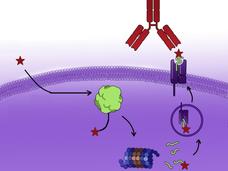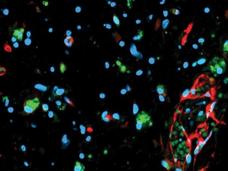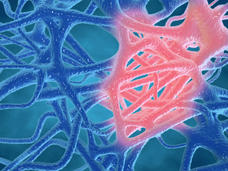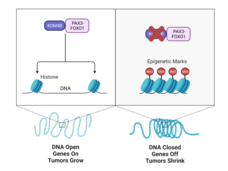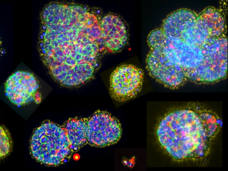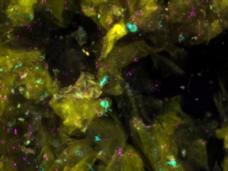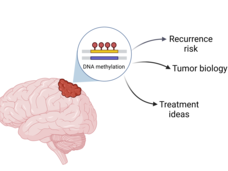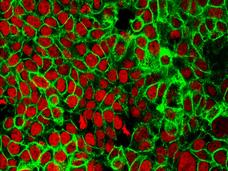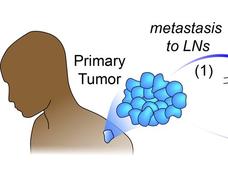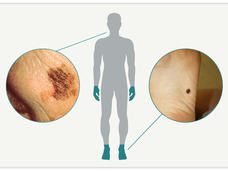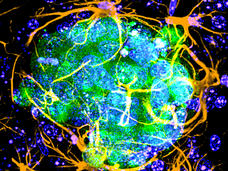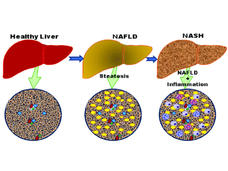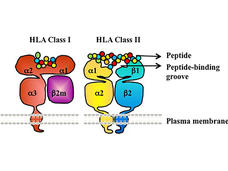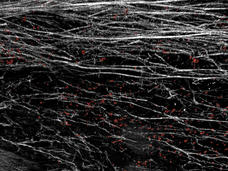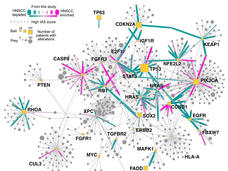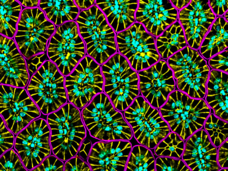Biology of Cancer - Cancer Currents Blog
Cancer biology research news, with context from experts at NCI and elsewhere. Topics include cancer metastasis, the tumor microenvironment, and new targets for cancer therapies.
-
Preventing Chemo Brain? Study Identifies Potential Approach for Common Problem
Cisplatin raises levels of a fat molecule called S1P in areas of the brain responsible for memory and information processing, a new study shows. S1P locks onto a protein on the surface of brain cells called S1PR1. In mice given cisplatin, drugs that block S1PR1 prevented cognitive problems.
-
Can Targeted Therapy for KRAS Mutations Double as Part of Immunotherapy?
Two research teams have developed a treatment approach that could potentially enable KRAS-targeted drugs—and perhaps other targeted cancer drugs—flag cancer cells for the immune system. In lab studies, the teams paired these targeted drugs with experimental antibody drugs that helped the immune system mount an attack.
-
Vulnerability in Brain Tumors May Open Door to New Treatments
Two companion studies have found different forms of some brain tumors, diffuse midline glioma and IDH-mutant glioma, become dependent for their survival on the production of chemicals called pyrimidines. Clinical trials are planned to test a drug that blocks pyrimidine synthesis in patients with gliomas.
-
Abnormal Collagen May Be Weak Spot for Pancreatic Cancer
Abnormal collagen that is formed only by pancreatic cancer cells ramps up activity that increases tumor growth and survival, a study found. In mice, blocking production or effects of the abnormal collagen made treatment for pancreatic cancer more effective.
-
Targeting Inflammation Emerges as a Strategy for Treating Cancer
Inflammation is considered a hallmark of cancer. Researchers hope to learn more about whether people with cancer might benefit from treatments that target inflammation around tumors. Some early studies have yielded promising results and more are on the horizon.
-
Targeting the Accomplice: A Potential Treatment Approach for Rhabdomyosarcoma
The fusion protein that drives the growth and survival of some rhabdomyosarcoma tumors relies on the KDM4B enzyme, researchers have found. Treating mice with a KDM4B-blocking drug and chemotherapy nearly eliminated rhabdomyosarcoma tumors with the fusion protein.
-
New Cancer Model Shows Promise in Predicting If Treatment Will Shrink Tumors
A research team hopes to offer oncologists a new tool to guide treatment choices for their patients. In a small study, a tumor model called micro-organospheres accurately predicted whether patients would respond to their chemotherapy treatment.
-
Androgen Receptor May Explain Sex Differences in Melanoma Treatment Response
Male patients with metastatic melanoma don’t live as long as females, and their tumors are more likely to become resistant to commonly used treatments. A new study may help explain why: the androgen receptor.
-
Immunotherapy’s Skin Side Effects: Are Microbes to Blame?
People with cancer who take immunotherapy drugs often develop skin side effects, including itching and painful rashes. New research in mice suggests these side effects may be caused by the immune system attacking new bacterial colonies on the skin.
-
New Way to Classify Meningioma Brain Tumors Suggests Potential Treatments
Two separate but complementary studies have identified a new way to classify meningioma, the most common type of brain tumor. The grouping system may help predict whether a patient’s tumor will grow back after treatment and identify new treatments.
-
Keto Molecule Offers Clue for Preventing Colorectal Cancer
In a study in mice, researchers showed that BHB, a compound produced while eating a ketogenic diet, may slow or stop colorectal cancer from growing. More studies are needed, they warned, to see if BHB has similar effects in humans.
-
Cancer in Lymph Nodes May Help Tumors Spread by Enlisting Immune Cells
Cancer often spreads to the lymph nodes, but it has never been clear why. A new study in mice suggests lymph node invasion helps the primary tumor spread, or metastasize, to other organs.
-
Body Location May Influence Fate of Cells with Cancer-Causing Mutations
Whether cells with cancer-related genetic changes will develop into tumors may partly depend on their location in the body, a new study finds. The study focused on a rare form of skin cancer, acral melanoma.
-
Alzheimer’s-Linked Protein May Help Melanoma Spread to Brain
Melanoma cells that travel to the brain produce their own amyloid beta, helping the cells survive and form metastases, a new study in mice shows. The Alzheimer’s-linked proteins appear to tamp down the brain’s immune response to the cancer cells.
-
Study Identifies Potential Drug Target to Prevent Some Liver Cancers
Researchers have found that mice that lack β2-spectrin protein in their livers are protected from nonalcoholic fatty liver disease and the most common kind of liver cancer, hepatocellular carcinoma.
-
Cancer Immunotherapies Don’t Work for Everyone: HLA Gene May Explain Why
A specific form of the HLA gene, HLA-A*03, may make immune checkpoint inhibitors less effective for some people with cancer, according to an NCI-led study. If additional studies confirm the finding, it could help guide the use of these commonly used drugs.
-
Can mRNA Vaccines Help Treat Cancer?
The success of mRNA vaccines for COVID-19 could help accelerate research on using mRNA vaccine technology to treat cancer, including the development of personalized cancer vaccines.
-
Tumors May Shed Protein to Create Barriers that Block Immune Cells
Cancer cells can shed a protein called DDR1 that helps collagen proteins create dense barriers around tumors. A study in mice showed these barriers can prevent immune cells from entering and killing tumors.
-
Studies Delve Deep into the Protein Machinery of Cancer Cells
A research team has identified common interactions between cancer-related proteins in cancer cells. They also created a map of how these protein complexes function in those cells and identified a promising treatment target for head and neck cancer.
-
Does Too Much Fructose Help Colorectal Cancers Grow?
Excess fructose can promote obesity and colorectal cancer, a new study shows. In mice, the study found that the sweetener, a component of table sugar and high-fructose corn syrup, increased how long normal and cancer cells in the intestines live.

